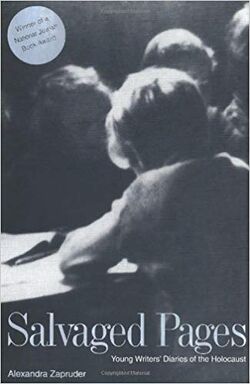Elisabeth Kaufmann (F / Austria, 1926-2003), Holocaust survivor
Elisabeth Kaufmann (F / Austria, 1926-2003), Holocaust survivor
- KEYWORDS : <Austria> <Refugees> <France> <United States>
- MEMOIRS : "The Diary of Elisabeth Kaufmann"
Biography
Elisabeth Kaufmann was born in 1926 in Vienna, Austria. The family fled to France in 1938. When the Nazis invaded France, they had to flee again. Eventually the family moved in 1942 to the United States on one of the last passenger boats to cross the Atlantic during the war.
Elisabeth Kaufmann (later Elizabeth Koenig) was born on March 7, 1924, to a cultured and established family. She spent her early childhood years in Vienna with her parents and her older brother Peter. After the German takeover of Austria in 1938, Jews were stripped of their rights. As a result, Elisabeth's family fled from Austria to Paris, living like thousands of others as refugees.
With the start of World War II in September 1939, xenophobia grew across Europe, and the Germans and Austrians who had originally fled to northern France and Paris to escape Nazi occupation were now declared enemy aliens, rounded up by French police, and sent to internment camps. Among them were Elisabeth's father and brother.
By May 1940, with the German occupation of France imminent, Elisabeth and her mother, along with thousands of other refugees and French citizens, headed south. Elisabeth and her parents found safety in the town of Saint Sauveur par Bellac, in an area ruled by the Vichy government. Several months later, with the assistance of a family friend, Elisabeth worked in Le Chambon-sur-Lignon, the Protestant village in southern France where thousands of Jews, especially children, were given refuge during the war.
By the fall of 1941, Elisabeth's parents had obtained visas to travel to America. The family arrived in Virginia Beach, Virginia, in early 1942. Her extended family—grandparents, aunts, and uncles—were equally fortunate and escaped occupied Europe and survived the Holocaust.
Diary
Sixteen-year-old Elisabeth Kaufmann was caught up in a dilemma during the spring of 1940. It revolved around a basic question that cut to the heart of her personal identity. Was she an Austrian or was she a Jew? Of course, there was no real reason why she couldn’t be both, but Nazi racist ideas didn’t allow for that possibility. The irony of Elisabeth’s situation was that she no longer lived in Austria; nevertheless, the question followed her when she left.
Nazi Germany took over Austria in 1938, so Elisabeth and her family fled to France to escape. In France, the government should have recognized German and Austrian Jews as refugees, but that isn’t what happened. Instead, when World War II began, the French government required many German and Austrian men, even refugees, to be interned as “enemy aliens”. This happened during the so-called “Phoney War” period from September 1939 until the beginning of May 1940. During this time, Germany attacked Poland in the east, but made no move against France in the west. The “Phoney War” ended on May 10th when Germany invaded Belgium, the Netherlands and Luxembourg. Then rumors began to circulate that the internment policy would be greatly enlarged.
On May 13th, Elisabeth wrote, “We, as Austrians, are in a great state of anxiety. The official decree does not clearly state whether Austrians fall under the internment order, or whether we have been excepted. Mother and I – I skipped school today – are running from one office to another and are being given evasive answers. One commissioner says ‘yes’ and another ‘no’. They play with our nerves as if they were toys. This kind of day is nerve-wracking and filled with doubt about losing in the next three days what one values most in life, what is left of our personal freedom.”
As it turned out, Elisabeth was not sent to an internment camp as she had feared on this day. Instead, she ended up fleeing for her life as the German army got closer and closer to Paris. When France fell, Elisabeth found refuge Le Chambon-sur-Lignon with the family of André and Magda Trocmé. Eventually, she and her parents were able to escape to the United States. She had won back that person freedom that was so important to her, but she was one of the lucky few to be able to do so.
You may read excerpts from Elisabeth Kaufmann’s diary in Salvaged Pages: Young Writers’ Diaries of the Holocaust by Alexandra Zapruder.
